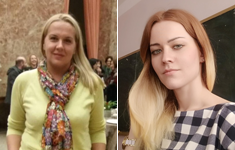Abstract
The purpose of the given article is to prove the efficiency of teaching ESP monologue production to students majoring in mechanical engineering by means of podcasting. The efficiency of the methodology devised was verified in the process of an experiment conducted at the Institute of Mechanical Engineering, Igor Sikorsky Kyiv Polytechnic Institute in the academic year 2018 – 2019, from September to December. Three experimental groups, thirty-four students in total, studying in their final year of Bachelor’s studies, participated in the methodological experiment. The main stages of any methodological experiment that comprise its “nucleus” are: pre-experimental assessment; experimental teaching and post-experimental assessment. The obtained results of the pre-experimental assessment indicated an insufficient level of the participants’ communicative competence formation in monologue production, thus proving the significance of developing new teaching methodologies for the future mechanical engineers. The experimental teaching lasted for 28 hours and took place in three experimental groups on the basis of the suggested set of tasks. The set of tasks inferred implementation of information and communication technology and was performed both in class and out of class. Working out-of-class, students performed tasks on the podcasting terminal, arranged by the experimenter on the Internet on a special educational platform called Canvas. The purpose of the post-experimental assessment was to evaluate the participants’ communicative competence formation in monologue production after the experimental teaching, thus, verifying the efficiency of the methodology devised. The methodological experiment performed and the data processed by methods of mathematical statistics with its further qualitative and quantitative analysis have confirmed that the process of teaching ESP monologue production to future mechanical engineers is effective on condition that the set of tasks that envisages podcasting implementation is used.
References
H. Bakaieva, O. Borysenko, I. Zuienok, ESP Study Program. Kyiv, Ukraine: Lenvit, 2005. (in Ukrainian)
V. Vinichuk, “The process of language teaching in the sphere of international politics and foreign affairs”, Foreign languages, no. 4(68), pp. 63-68, 2011. (in Ukrainian)
Yu. Lavrysh, English for specific purposes. Business communication. Devised for students studying within the Subject Areas 131 Applied mechanics, 133 Industrial Engineering. Kyiv, Ukraine: Igor Sikorsky Kyiv Polytechnic Institute, 2017. (in Ukrainian)
O. Vashchylo, “Methodological principles of teaching monologue speech to MA students majoring in mechanical engineering”, Bulletin of Alfred Nobel University. Series: Pedagogy and Psychology, no. 1(9), pp. 85-93, 2015. (in Ukrainian)
O. Vashchylo, “Podcasting technology in the process of teaching ESP monologue speech to students majoring in mechanical engineering”, Visnyk of the Kyiv National Linguistic University (KNLU), Series “Pedagogy and Psychology”, no. 29, pp. 50-61, 2018. (in Ukrainian)
O. Vashchylo, “Modelling of the ESP monologue speech teaching process to future mechanical engineers”, Bulletin of the T.H. Shevchenko National University “Chernihiv Colehium”, no. 156, pp. 34-38, 2018. (in Ukrainian)
P.B. Gurvich, Theory and practice of the experiment in language teaching. Vladimir, Russian Federation: VGPU, 1980. (in Russian)
L. Bachman, A. Palmer, Language assessment in practice. Oxford, England: Oxford University Press, 2010. (in English)
N. Carr, Designing and Analyzing Language Tests. Oxford, England: Oxford University Press, 2011. (in English)
C. Coombe, P. Davidson, B. O’Sullivan, S. Stoynoff, The Cambridge Guide to Second Language Assessment. Cambridge, England: Cambridge University Press, 2012. (in English)
V. Bespalko, “Practice of the knowledge assessment criteria development and application”, Soviet Pedagogy, no. 4, pp. 52-69, 1968. (in Russian)
E.V. Sidorenko, Mathematical methods of data processing in psychology. St. Petersburg, Russian Federation: Rech, 2003. (in Russian)
Authors who publish in this journal agree to the following terms:
- Authors hold copyright immediately after publication of their works and retain publishing rights without any restrictions.
- The copyright commencement date complies the publication date of the issue, where the article is included in.
Content Licensing
- Authors grant the journal a right of the first publication of the work under a Creative Commons Attribution-NonCommercial-ShareAlike 4.0 International License (CC BY-NC-SA 4.0) that allows others freely to read, download, copy and print submissions, search content and link to published articles, disseminate their full text and use them for any legitimate non-commercial purposes (i.e. educational or scientific) with the mandatory reference to the article’s authors and initial publication in this journal.
- Original published articles cannot be used by users (exept authors) for commercial purposes or distributed by third-party intermediary organizations for a fee.
Deposit Policy
- Authors are permitted and encouraged to post their work online (e.g., in institutional repositories or on their website) during the editorial process, as it can lead to productive exchanges, as well as earlier and greater citation of published work (see this journal’s registered deposit policy at Sherpa/Romeo directory).
- Authors are able to enter into separate, additional contractual arrangements for the non-exclusive distribution of the journal's published version of the work (e.g., post it to an institutional repository or publish it in a book), with an acknowledgement of its initial publication in this journal.
- Post-print (post-refereeing manuscript version) and publisher's PDF-version self-archiving is allowed.
- Archiving the pre-print (pre-refereeing manuscript version) not allowed.


